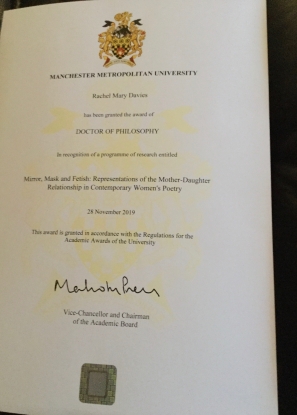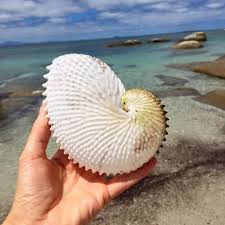To be honest, I’m stuck for content for the blog now the PhD is done. What do you put in a blog whose banner headline reads ‘PhD and Poetry’ when the PhD is finished, all bar the dancing, and the poetry has been slack? When I was coming to the end of the creative section of the PhD, Jean Sprackland asked me what I was going to do now, and I said I was going to spend the rest of my life reading shite! Seriously, I didn’t want to read anything again, for ever, that required me to think and analyse.
I tried it in the summer. I didn’t like it much. I read a couple of Tudor murder mysteries in which the author seemed more about impressing her readers with her knowledge of the period than with losing them in the story. I decided there was only so much shite the human brain can take and I pulled back on the pledge.
I stepped up a gear. I decided to re-read Margaret Atwood’s The Handmaid’s Tale. I read it years ago, and the recent television series had tickled the reading tastebuds: I wanted to see if the TV adaptation had stayed true to the book. It had, pretty much. What a mind Atwood has; and how prophetic is that book, written in the eighties? In 21st century UK, I felt as if I was living through the foothills of the tale, with regime change in the USA and the far right on the rise across the western world. I read it on my Kindle, enjoyed it in a kind of masochistic way, so much that I wanted a copy. I ordered a hard backed version online, a book to pick up, touch, admire. When The Testaments was published in September 2019, I had to have a copy of that and read it too. How could Atwood follow up on The Handmaid’s Tale, which had left an ending that was open to a sequel? But that was thirty years ago. How would it work now? And was it just cashing in on the TV adaptation? It wasn’t, it was wonderful and surprising reading. And if you haven’t read it yet, I recommend it. Highly. And if you haven’t read the original Tale, you’ll need to read that first to really get the sequel. Hilary and I went to see Atwood ‘in conversation’ at the Lowry theatre in October. I had dreams of getting my two lovely books signed, but that was a pipedream: she wasn’t doing a signing. But I have them on my shelves to re-read whenever I feel it coming on.
I read a William Boyd novel, Waiting for Sunrise; I’ve never been disappointed by a William Boyd novel. This one came close. I enjoyed it, but I didn’t lose myself in it, it wasn’t as gripping as some of his books. Perhaps I just didn’t believe in his hero, Lysander Rief. The first few pages are an imagining of the reader watching this man walking through Vienna. Towards the end of these introductory pages Boyd has the line ‘Ah, he’s English—how uninteresting—your curiosity is waning.’ And my curiosity never really waxed again. I stuck with it to the end though, and it was, I suppose, a good story; but I wasn’t gripped.
I re-read Aldous Huxley’s Brave New World. I read it at the night class where I studied for A-level English, and remembered really enjoying it. I enjoyed it again, probably on a different level, or a series of different levels. Having lived through the scientific and technological revolution of the intervening forty years, it, like Handmaid’s Tale, seems all too possible—probable even. Is it serendipity that these dystopian novels become reality; or is it inevitable? I went on to read a collection of essays Huxley wrote in the eighties, Brave New World Revisited, in which he analyses the actual world in the light of both his dystopian vision, and George Orwell’s in 1984. His essays are spot on too, and distinctly disturbing.
I read Edna O’Brien’s The Country Girls Trilogy. The first in the series, The Country Girls, O’Brien claimed ‘wrote itself in three weeks.’ Lucky her; it rocked the Irish establishment, and it isn’t hard to see why. Read it with the unsophisticated eyes of the early sixties, when Lady Chatterley was on trial as pornography, and understand why a sexually and religiously conservative society like the Republic of Ireland would be shocked. I loved it.
I read Katie Hale’s debut novel, My Name is Monster. Its plot is that one woman is left on Earth after an apocalyptic event—we’re never told exactly what the event was, although it involved war and disease. (Why do I seem drawn to dystopia since completing my PhD? There must be a thing here?) When I read the first few pages I thought ‘How is Hale going to make a novel out of one woman and a shattered world?’ She does, in surprising ways. If you haven’t read it, I recommend it.
I’ve read other stuff too: I am a prolific reader. I could read before I went to school. And because I could read already, the infant teacher put me out in a cold corridor with a book while she taught the ‘normal’ pre-literate children how to do it. I was miserable, cold, lonely—all emotions I came to relate to reading. I didn’t pick up another book for enjoyment until I was a young adult. Oh my, what had I missed? I haven’t stopped since. On Thursday I met up with Hilary for coffee—our first catch up since the carousel week in December. We swapped Christmas presents. She gave me The Craft, edited by Rishi Dastidar (Nine Arches Press; 2019)—‘a guide to making poetry happen in the 21st Century’. It contains essays by some of my favourite poets: Liz Berry, Carrie Etter, Karen McCarthy Woolf to name just a few. There’s a section of writing prompts at the end, which I’m looking forward to trying out. I can’t wait to read it. It’s on top of my ‘to-read’ list.
To bring us full-circle, Hilary also gave me a second book, from a mutual friend, Jo. When we all went to see Simon Armitage in Conversation with Guy Garvey in November, Jo asked me what I’m going to do now the PhD is over—this is a common conversational ice-breaker. I repeated my pledge about reading shite, but explained that I’d tried it and didn’t like it much, but I needed to read stuff that wasn’t too taxing, give my poor old brain a rest. She said she had just the book. Hilary brought that book with her on Thursday. M. C. Beaton’s Agatha Raisin and the Quiche of Death (Constable and Robinson:1992). Jo put an inscription on the title page: ‘To Rachel. Read it and weep (a lot!)’ I’m a part-time insomniac and I woke at 3.00 on Saturday morning this week, so I decided to read it to stop the brain racing. Thanks Jo, it hits the spot perfectly: frothy, inconsequential, insubstantial ‘shite’. I love it.
Before I go, a reminder about the Poets&Players competition, judged by Sinead Morrisey. The closing date is midnight on Tuesday 21st January; which gives you just under ten days to get your poems to me via the online route or to Viv in the post. Details and rules are on our website: https://poetsandplayers.co
I’ll leave you with another poem that did well in a competition. It was placed third in the Manchester Cathedral Competition in 2015. The competition asks for entries ‘of a spiritual nature’; being an atheist this is easy: everything under the sun is spiritual, so I entered this, written after a visit to Tate Liverpool and being gripped by a huge and totally wonderful painting by Leonora Carrington.
Ix Chel and the Madonna
The Magical World of the Mayas Leonora Carrington
Tate Liverpool May 2015
One eye a telescope the other a microscope
you see it all, how the land is a woman
reclining—sleeping or dying—her breasts pert
her belly taut while Mayan temples
and Catholic symbols spring like Cain and Abel
from between her knees and each tries to win
her best breast. You see it all, how the earth
blurs the binaries of night and day, truth and lie,
old and new, gods and God until they all seem
the same somehow, indistinct, not to be trusted.
You see it all, how a thousand crucifixes can pierce
her left breast, pierce her heart and still Ix Chel
breathes through her death throes, how the wood
of Calvary grows on her abdominal plain even
as the Ceiba tree withers, its branches bleached,
leafless, its roots in the realm of the dead atrophied
to stumps that can no longer suck the waters
of faith. You see it all, how Madonna and Child
process across her skin and her skin rends open
exposing the powerless jaguar god of the underworld
where the Monkey Twins hide themselves behind human
death masks, learn to live out eternity in the dark.
You see it all, how Kukulkan still slithers across
an angry sky crying I’m here, I’m here and none hears
but the dying few, how Chaak the thunder god
weeps tears plump as pears at Ix Chel’s passing
and the Popl Vuh hands down its myths to anyone
who will listen and you listen and you see it all.
Rachel Davies
2015
(First published in Manchester Cathedral Competition Winners Pamphlet 2015)






